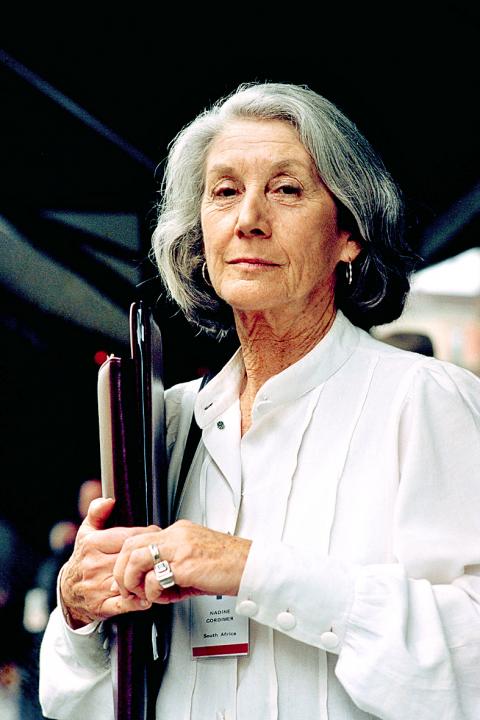South African Nobel Prize-winning writer and anti-apartheid activist Nadine Gordimer, who became an icon through her unique insights into the country’s social agonies, has died at the age of 90.
Through 15 novels, several volumes of short stories, non-fiction and other works published in 40 languages around the world, Gordimer eviscerated white minority rule under the apartheid system and its aftershocks once democracy was achieved in 1994.
The writer, who was awarded the Nobel Prize for Literature in 1991, died peacefully in her sleep at her home in Johannesburg on Sunday, her family said.

Photo: AFP
Gordimer’s reputation was earned through a series of novels including A Guest of Honour, The Conservationist, Burger’s Daughter, July’s People and A Sport of Nature, which the Nobel committee called “magnificent epic writing.”
News of her death prompted an outpouring of tributes, notably from the Nelson Mandela Foundation, which described Gordimer as “a great writer, patriot and voice for equality and democracy.”
Late South African president Nelson Mandela had a long friendship with Gordimer, the foundation said.
In his autobiography, Mandela wrote of his time in prison: “I read all the unbanned novels of Nadine Gordimer and learned a great deal about the white liberal sensibility.”
The ruling African National Congress party said Gordimer was a party member while it was a banned organization, adding that the country “has lost an unmatched literary giant whose life’s work was our mirror and an unending quest for humanity.”
For Gordimer, her profession was an affliction: “Writing is indeed some kind of affliction in its demands as the most solitary and introspective of occupations,” she once said.
The anti-apartheid activist also said it was not truth itself which was beauty, but the hunger for it.
She found this hunger at a young age when she spent her childhood secluded in libraries.
“Only many years later was I to realize that if I had been a child in the black category, I might not have become a writer at all, since the library that made this possible for me was not open to any black child,” she said in her Nobel acceptance speech.
Born on Nov. 20, 1923, Gordimer grew up in an affluent suburb of the gold mining town of Springs, east of Johannesburg.
Her mother believed she had a weak heart and often kept her home from school. With time on her hands, she started writing at the age of nine and published her first story, Come Again Tomorrow in the children’s section of a Johannesburg magazine when she was 14.
Gordimer came face-to-face with the liberation struggle when her best friend, Bettie du Toit, was arrested for anti-apartheid activities in 1960. She went on to chronicle apartheid society, the liberation struggle, its forbidden friendships and its underground networks.
“To have lived to see the end coming, and to have had some tiny part in it has been extraordinary and wonderful,” Gordimer said after the end of apartheid in 1994.
In her final years she kept out of the spotlight, preferring to commit her views on the country’s democracy to paper than talk about them.
In one interview, she said that in the new South Africa: “There are things that are remarkably good and things that are very, very worrying.”

‘EYE FOR AN EYE’: Two of the men were shot by a male relative of the victims, whose families turned down the opportunity to offer them amnesty, the Supreme Court said Four men were yesterday publicly executed in Afghanistan, the Supreme Court said, the highest number of executions to be carried out in one day since the Taliban’s return to power. The executions in three separate provinces brought to 10 the number of men publicly put to death since 2021, according to an Agence France-Presse tally. Public executions were common during the Taliban’s first rule from 1996 to 2001, with most of them carried out publicly in sports stadiums. Two men were shot around six or seven times by a male relative of the victims in front of spectators in Qala-i-Naw, the center

Canadian Prime Minister Mark Carney is leaning into his banking background as his country fights a trade war with the US, but his financial ties have also made him a target for conspiracy theories. Incorporating tropes familiar to followers of the far-right QAnon movement, conspiratorial social media posts about the Liberal leader have surged ahead of the country’s April 28 election. Posts range from false claims he recited a “satanic chant” at a campaign event to artificial intelligence (AI)-generated images of him in a pool with convicted sex offender Jeffrey Epstein. “He’s the ideal person to be targeted here, for sure, due to

DISPUTE: Beijing seeks global support against Trump’s tariffs, but many governments remain hesitant to align, including India, ASEAN countries and Australia China is reaching out to other nations as the US layers on more tariffs, in what appears to be an attempt by Beijing to form a united front to compel Washington to retreat. Days into the effort, it is meeting only partial success from countries unwilling to ally with the main target of US President Donald Trump’s trade war. Facing the cratering of global markets, Trump on Wednesday backed off his tariffs on most nations for 90 days, saying countries were lining up to negotiate more favorable conditions. China has refused to seek talks, saying the US was insincere and that it

As Elon Musk called one of US President Donald Trump’s top economic aides a “moron,” the White House on Tuesday declared that “boys will be boys.” Musk and long-time Trump trade adviser Peter Navarro have been squabbling publicly over Trump’s decision to impose sweeping tariffs on most of its trading partners. The move has triggered a market sell-off and prompted analysts to wonder if the US is headed into a recession. “Look, these are obviously two individuals who have very different views on trade and on tariffs,” White House press secretary Karoline Leavitt said. “Boys will be boys, and we